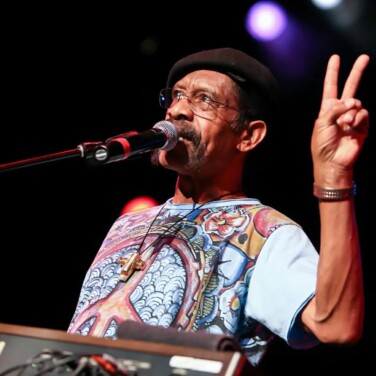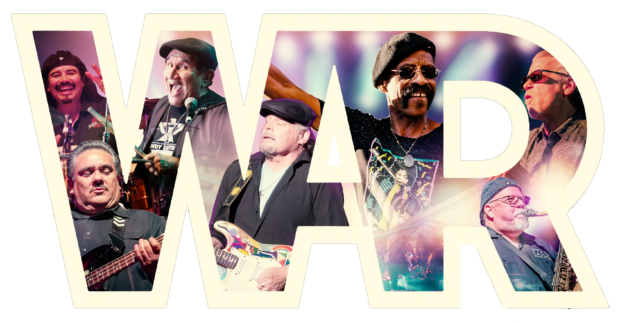
August 27, 2023
Reflections: War
Via Relix
There are war stories and then there are War stories. Like the one about the party in Bel Air, Calif., sometime in 1969 or ‘70, when Eric Burdon—whose last bunch of Animals had split up—was still fronting the band in their earliest days. Members of The Rolling Stones and The Beach Boys were on hand, as was Grace Slick of Jefferson Airplane. And Jim Morrison, who was—as Jim Morrison was wont to do—getting a little out of control.
“The party was at Jerry’s house,” remembers singer-songwriter and multi-instrumentalist Lonnie Jordan, one of the co-founders of War, referring to the band’s producer/manager Jerry Goldstein. The way both Jordan and Goldstein tell it, Jordan was playing a melody on the house piano when Morrison began to interrupt him—repeatedly. “Stop! I’ll tell you when to sing,” Jordan said, scolding The Doors frontman. Morrison, a huge star, was not used to being told to pipe down.
“Morrison was getting frustrated,” Goldstein recalls. So much so that he slammed the piano lid down as the War member was still playing.
Jordan pulled his fingers out just in the nick of time, leading to a scuffle that was, Jordan says, “just like an old-time Western movie. We were rolling all over each other.”
That was enough for Burdon. The British singer bolted upstairs, fetched a gun “and shot the chandelier out,” Jordan says. “I’m from Compton so I was the only one in the room who ducked when I heard the gunshot. The rest of the party didn’t care one way or the other.”
Fortunately, War spent a lot more time creating memorable music than getting involved in alcohol and dope-fueled brawls. Their best-known songs, many excerpted and developed from impromptu jams, include such hits as “Spill the Wine,” “All Day Music,” “Slippin’ Into Darkness,” “The Cisco Kid,” “Gypsy Man,” “Why Can’t We Be Friends?” “Low Rider,” and “Summer,” among others. No two of their biggest songs sounded alike. War’s hybrid style—fusing funk, soul, jazz, rock, Latin and psychedelia— was remarkably diverse.
“The World Is a Ghetto,” War’s late 1972 Top-10 single, served as the title track for the band’s sole number one LP, which was later confirmed as the best-selling album of 1973 by the music industry bible Billboard.
Although War as an entity had been newly formed at the end of the ‘60s, the collective had roots stretching all the way back to the early part of the decade and a Long Beach, Calif., band called The Creators. At the same time, Brooklynite Goldstein was spending his own formative years co-writing such AM radio smashes as “My Boyfriend’s Back” (The Angels) and “Come on Down to My Boat” (Every Mother’s Son), and serving as a member of The Strangeloves (“I Want Candy”). Flash-forward several years: Goldstein was co-running a successful poster business in LA when he was nudged by a colleague to go hear the all-Black band that would become War. Goldstein convinced Burdon—bummed about The Animals’ breakup—to tag along, and the latter brought Lee Oskar, a hot Danish harmonica whiz, with him. Within days the two Europeans, bowled over by what they’d heard, had joined forces with the Americans.
“They [the future War] were backing up Deacon Jones of the LA Rams, who had a Vegas act,” recalls Goldstein. “When I saw them, they were unbelievable, but I didn’t know what to do with them because they were so different from anything I’d ever heard. I just knew there was something real there.”
By early 1970, Goldstein had nabbed the band a deal with MGM Records and work had begun on their debut, which they called Eric Burdon Declares “War.” The octet was an immediate success, but after one more release with War, Burdon parted ways with the group. It took three more albums on their own before War found the level of success Goldstein had envisioned for them. Now celebrating its 50th anniversary, The World Is a Ghetto is slated to receive a Record Store Day upgrade this fall, with bonus tracks, outtakes and the like.
“The first [post-Burdon] War album was basically everybody’s idea of what War should be—everybody in the band—and I just allowed it to happen,” Goldstein says. “Each guy did his own thing; it was something that they had to get out. When we got to the second album, All Day Music, we started writing new stuff in the studio and creating jams. But when we got to The World Is a Ghetto, we were ready for the big album.”
Although their commercial success dried up long ago, War is still in business today, with Jordan still leading the outfit and Goldstein still involved on the business side. Recently, The Galaxy Remixes—a collection of classic War tunes updated by remixers such as DJ Logic and Mix Master Mike—was released to positive feedback.
Jordan, the only member of the original lineup still with War, just goes with the flow, happy to bring the band’s music to new generations and keep the legacy alive. “I’m the same; I have never changed. The music’s the same,” he says. “It’s still about grooves and messages. Our performance onstage has gotten much better; it’s more exciting than it’s ever been.
“It’s a different era now,” he continues. “Back in the day, we could play long songs while people were getting high. Now, we do more of the hits—but not songs that they don’t remember. People have shorter attention spans. Some of the young kids that come to see us know all the lyrics; they Google everything,” he adds. “They know more about my past than I can remember. It’s amazing.”
